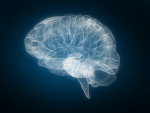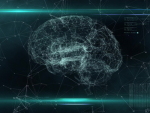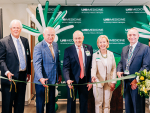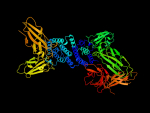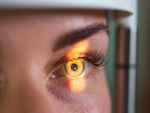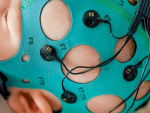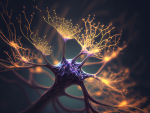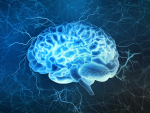Displaying items by tag: department of neurology
By prohibiting the Activin A protein from functioning, researchers were able to halt the development of dyskinesia symptoms and effectively erase the brain’s “bad memory” response to L-DOPA treatments.
Tagged under
The new, five-year grant will support research in the UAB Alzheimer’s Disease Research Center to address dementia disparities in the Deep South.
Tagged under
Ninety-two percent of evaluable patients treated with INB-200 exceeded a median progression-free survival of seven months. Glioblastoma multiforme is the most aggressive type of cancer originating in the brain.
Tagged under
The new Brain Aging and Memory Hub will house the UAB Divisions of Neuropsychology and Cognitive and Behavioral Neurology, as well as the Alzheimer’s Disease Center and the Evelyn F. McKnight Brain Institute.
Tagged under
Muhammad Ali Abdullah is graduating with two degrees, profound research and clinical experience, and memories to cherish for a lifetime; he will be returning to UAB this July as a medical student.
Tagged under
The Goldwater Program received 1,353 nominations from 446 institutions this year, and the winners will receive a scholarship covering tuition, housing, fees and books.
Tagged under
- release
- college of arts and sciences
- neuroscience
- school of medicine
- department of neurology
- department of cell developmental and integrative biology
- department of philosophy
- graduate school
- honors college
- office of the provost for student and faculty success
- national and international fellowships and scholarships
- students
The annual race will be held Saturday, May 18, at Railroad Park. A virtual option will be offered this year.
Tagged under
Results showed that African American veterans with PTSD had a higher risk of rehospitalization than those without PTSD. However, white veterans with PTSD did not have a significantly higher risk of rehospitalization post-stroke.
Tagged under
Multiple system atrophy is a rare and fatal neurodegenerative disease, with no known disease modifying therapy.
Tagged under
These findings could lead to non-invasive, low-cost tests and the early diagnosis of the disease, which progresses for decades before symptoms of dementia emerge.
Tagged under
New findings from UAB researchers indicates that preventable environmental factors like repeated blows to the head in contact sports and pesticides and herbicides account for a substantial number of Parkinson’s disease cases.
Tagged under
Most seizures occur in non-medical settings. A UAB epilepsy expert provides information on best practices to help individuals during a seizure.
Tagged under
The task force will develop and disseminate strategies, resources and guidance to better service the Alzheimer’s population.
The M.D./Ph.D. student has since moved on to clinical studies, but the research into possible drugs to treat Alzheimer’s disease continues.
Tagged under
While preventive treatment with vigabatrin delayed the onset and prevalence of infantile spasms in TSC infants, it had no impact on focal seizures, drug-resistant epilepsy, or improvement of cognitive and behavioral scores at 24 months.
Tagged under
Rachel Smith, Ph.D., professor in the UAB School of Engineering and principal investigator in the Neural Signal Processing and Modeling lab, was recently awarded multiple grants to fund research in seizure onset localization.
Tagged under
TCE is a known environmental risk factor for parkinsonism. UAB researchers will evaluate whether T cell activation caused by TCE exposure leads to cognitive decline.
Tagged under
The National Ataxia Foundation has named UAB a Center of Excellence. The designation is awarded to regional centers providing comprehensive care and services for individuals affected by ataxia and their families.
Tagged under
Periodontal disease is one of the leading causes of tooth loss in adults and may be a risk factor in the development of Alzheimer’s disease.
Tagged under
In a mouse model, border-associated macrophages, not microglia, were essential for the neuroinflammation that precedes neurodegradation. Targeting this subset could be a disease-modifying therapy in neurodegenerative disease.
Tagged under
